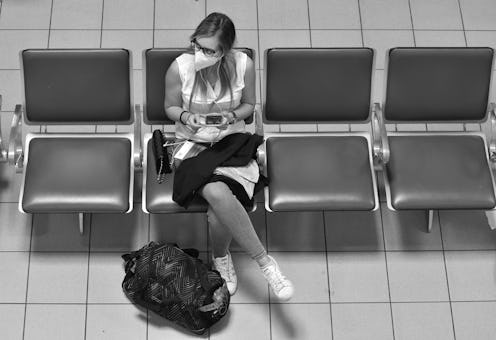Health
How To Self-Quarantine If You're Going To Another State
You can’t just join a new quarantine pod.

It can be tempting to plan trips around visiting friends and family now that lockdowns are starting to lift, but experts warn that it's often necessary to self-quarantine whenever you go to another state. The Centers for Disease Control & Prevention (CDC) currently don't have a blanket recommendation for everybody to self-quarantine, but many states and local authorities require all interstate visitors to quarantine for 14 days when they arrive. This is particularly crucial if you're coming from or going somewhere where COVID-19 cases have recently spiked, or if you're going to be around anybody who is particularly vulnerable to the virus.
What Is Self-Quarantining?
Self-quarantining involves staying inside and away from everybody else in the household, including those you might have come to visit in the first place. It's not the same as self-isolation. "If you are infected, you undergo isolation," Dr. Thomas A. Russo, M.D, chief of the Division of Infectious Diseases in the Department of Medicine at University at Buffalo, tells Bustle. "If you have had close contact [with people who have COVID] but are not established to be infected, you undergo quarantine."
A 14-day quarantine after potential exposure is recommended because that's thought to be the maximum amount of time it takes for a person to develop COVID.
Self-quarantine means you need to be pretty cautious about your interactions with others. According to Johns Hopkins Medicine, you should remain at home, have no visitors, stay at least six feet away from everybody else in your house if possible, and avoid sharing food or even cutlery. While you're quarantining, Dr. Russo says, you need to monitor yourself for the development of COVID-19 symptoms — cough, shortness of breath, loss of smell or taste, fever, and others. If any of them show up, get tested ASAP — and if it's positive, isolate.
Why Self-Quarantine After Interstate Travel?
"When traveling from state to state, self-quarantine is not always necessary," Dr. Russo says. "However, there are circumstances when quarantine is required or highly recommended."
"If you’re traveling from a state with high infection rates to somewhere the virus is under control, you should plan to self-quarantine for 14 days to ensure that you’re not unknowingly spreading coronavirus and worsening the pandemic," Dr. Sachin Nagrani, M.D., medical director at telehealth provider Heal, tells Bustle. It's important to keep on top of local state requirements, as infection rates and restrictions are changing all the time. "Certain states, such as New York, require a mandatory self-quarantine for 14 days if you enter from a state that has a positive testing rate for SARS COV-2 of 10% or greater," says Dr. Russo.
Dr. Russo says it's also necessary to self-quarantine if you've had close contact with anybody known or highly suspected to have been infected with the coronavirus. You should be quarantining for 14 days after you saw that person, regardless of where you are. You should also self-quarantine if you've been in contact with people who may have been infected, particularly if the city or area where you met is a hotspot for infection, or if you weren't using masks.
You also need to keeping doing things like hand-washing and mask-wearing before and after you self-quarantine. "No one mitigation strategy works well in isolation," Dr. Neal Shipley M.D., medical director at Northwell Health-GoHealth Urgent Care, tells Bustle. "The combination of quarantining those who may have been exposed, wearing face coverings, hand-washing, and social distancing will all work better when used together.”
Should You Self-Quarantine If You Can't Get A Test?
"Self-quarantine is required for two major reasons," Dr. William Greenough M.D., professor of medicine and clinical chief of the Ventilator Rehabilitation Unit at Johns Hopkins Bayview Medical Center, tells Bustle. "First, we have failed so far in testing travelers conveniently, even when coming from areas with escalating epidemics of COVID-19. Second, we do not know who is actually positive." Without sufficient accessible testing for everybody, and with a large segment of the population possibly asymptomatic, it's safer to just stay confined to barracks if you must move between places.
How Should You Self-Quarantine?
If you have to self-quarantine, preparation is key. "Make sure that you have enough of the necessary supplies to last for several weeks," Dr. Taylor Nelson, D.O., assistant professor of clinical medicine in the infectious diseases division at University of Missouri Hospital, tells Bustle. "This would include non-perishable food items, medication prescriptions, bathroom tissue, and so on." She recommends moving all of your important medical appointments to the phone or online, and making sure you have all the cleaning products that you need. You won't be allowed to leave your house, so get Netflix and Zoom dates queued up.
When Is Self-Quarantining Not Necessary?
There is one situation where self-quarantining isn't necessary. "If when traveling, you can immediately get tested and are negative, then there's no need to quarantine," Dr. Greenough says. If you can get tested, you need to quarantine until you can receive your results, which takes around three to five days, or until the 14-day incubation period is up.
Experts:
Dr. William Greenough M.D.
Dr. Sachin Nagrani M.D.
Dr. Taylor Nelson D.O.
Dr. Thomas A. Russo M.D.
Dr. Neal Shipley M.D.
This article was originally published on